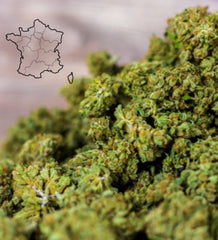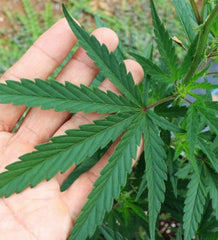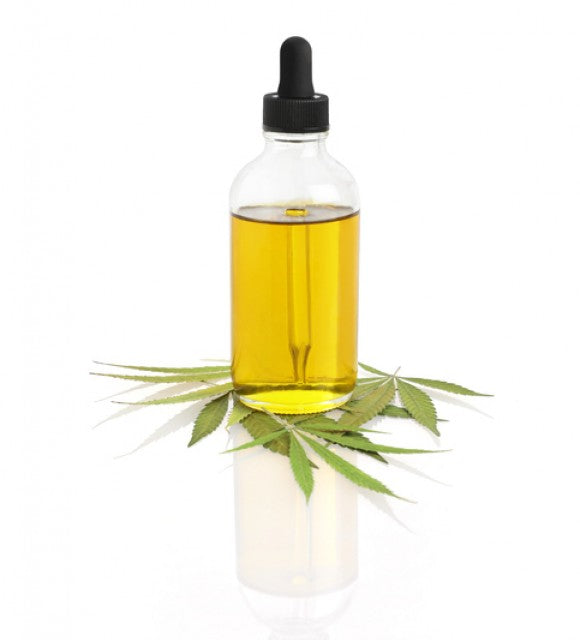
Cannabis Oil: A Complete Guide
What is cannabis oil?
Cannabis oil is a product made from cannabidiol (CBD), a molecule belonging to the cannabinoid family, directly extracted from the hemp plant. In France, hemp cultivation areas have continued to grow over the years; there are more than 21,000 hectares of hemp on our French agricultural land, an expanding economic fabric that contributes to the development of numerous processes such as the construction of buildings, ropes, and the expansion of the textile industry.
Gradually, cannabis, once considered a drug, has become a therapeutic tool available to everyone, to relieve our health problems such as inflammation and pain, in order to improve the quality of life of users. It is thanks to scientific advances that CBD has been recognized as a natural solution with numerous medicinal benefits, validated and legalized in many countries around the world. It comes in various forms and dosages, from CBD flowers, to oils, including cosmetic treatments. However, its use must remain supervised and regulated to avoid any abuse and health risks for consumers.
Produce cannabis oil
Cannabis production takes place in several distinct stages:
- First, the hemp is planted in deep soil during the spring period (March/April).
- Then, after the growth phase in June and the flowering phase in August, it is the turn of the hemp harvest with a combine to collect the seeds and a press to make bales with the straw.
- Then, the third step is the drying process using a specific dryer by hanging the hemp branches upside down.
- The fourth and final step is defined as grinding the plants into a fine powder which serves as the basis for extracting the CBD.
The CBD collection system
The presence of THC depends on the extraction process carried out before the final product is manufactured, whether it is CBD flower seeds, capsules or resins. Usually carried out after the harvesting and drying period, CBD extraction is a technical method that can be carried out using 3 different processes.
CO2 extraction of cannabidiol
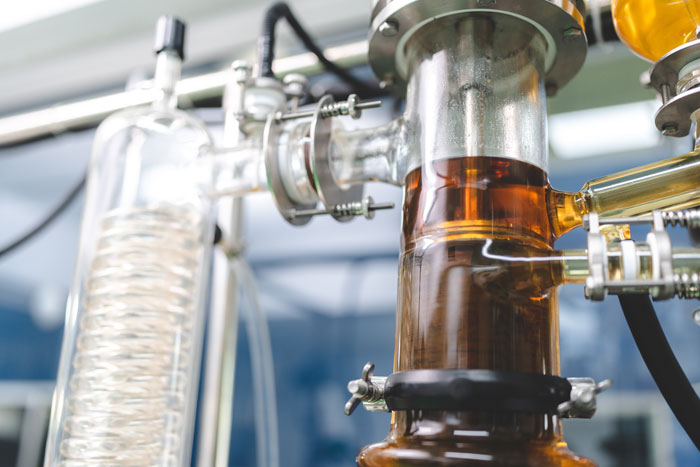
CO2 is heated and compressed until it reaches a liquid and gaseous form, called a "supercritical state", which allows it to extract the compounds of the hemp plant, including CBD. Once the CBD in the plant is dissolved, the CO2 is eliminated in gaseous form, giving rise to cannabis oil. This cannabidiol extraction process is considered precise and efficient, as it produces pure and high-quality CBD oil, without resorting to the use of chemicals that are toxic to human health and the environment.
The solvent extraction method
The method involves using diluents such as butane or ethanol. The hemp plant is soaked in this solvent-based mixture, which extracts cannabidiol from the plant's other compounds, including THC. The solvent then evaporates, leaving a liquid substance: CBD oil. This method is prioritized by the industrial sector, which focuses on producing CBD oils in large quantities and of superior quality. However, it is a complex and expensive process that must be carried out with the utmost care to avoid leaving any residue in the final product, which could be toxic to the human body.
The ultrasound process
This method uses high-intensity sound frequencies at the limit of human hearing, around 20 kHz. A piezoelectric transducer creates a sound signal that passes through a solvent to the hemp plant. The plant undergoes internal breakdowns that release its organic compounds, such as CBD. It's a reliable, fast, and environmentally friendly method, but it requires expensive, technical equipment.
After extraction
Once the cannabidiol has been extracted, it is possible to completely or partially remove the THC content in order to create isolated CBD or broad-spectrum products that comply with European legal standards. Indeed, the legal limit is a maximum of 0.3% THC in the cannabidiol-based product, under penalty of criminal prosecution, fines, and seizure of the products. This phase is called "CBD purification" and ensures the removal of unwanted substances and impurities through processes such as distillation, chemical degradation, or chromatography.
Finally, the final step in the production of CBD oil involves conducting tests to obtain certification that it meets current cannabidiol product quality and purity standards. This quality certification allows the product to proceed to the packaging and marketing phases.
Who is cannabis oil for?
CBD oils are intended for a range of people with diverse profiles, such as children, adults, athletes, or sedentary people, as long as they feel the need to benefit from the therapeutic effects of CBD in their daily lives. Indeed, devoid of THC (or with an excessively low level), CBD oil has such exceptional healing properties that this has allowed it to gain popularity across the world over the last decade.
Considered a product for physical and mental well-being, CBD oil is a dietary supplement that can easily be included in an adult's lifestyle. In the morning to reduce the impact of pain or in the evening to regain a state of tranquility conducive to sleep, cannabidiol oil actively participates in relieving stress, inflammation, and nighttime nervousness. In children, this cannabinoid-derived oil is effective in reducing epileptic seizures (including Dravert syndrome), alleviating hyperactivity, and improving concentration.
However, the right dosage must be found for minors and those around them, in order to ensure that they benefit from its medicinal power without creating any drug interactions . To do this, it is advisable to consult a health professional (general practitioner, naturopath) who has the skills and know-how necessary to guide you on the right amount needed to obtain benefits for your health, without the risk of harming you!
The effects of CBD oil on health
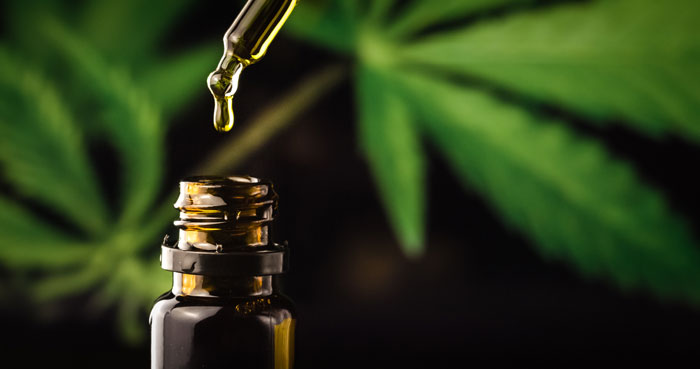
If the use of cannabis for therapeutic purposes has become more widespread throughout the world in recent years, it is because it represents a natural and economical alternative to many everyday ailments, sources of physical and mental discomfort for millions of patients across the globe. In the USA, almost 1 in 2 patients have stopped their medication to use the benefits of CBD. In France, thousands of patients are supplementing the curative action of their medications with CBD-based products such as oils, whether by personal choice or under the guidance of healthcare professionals who monitor the progression of their illness and its symptoms.
A calming of sleep cycles
When we know that 1 in 3 people in France suffer from chronic sleep-related disorders, it is easy to guess that using natural methods seems more beneficial in the long term than using sleeping pills and anxiolytics. And for good reason, sleep is one of the essential biological functions that ensure human beings maintain a life balance, conducive to maintaining good overall health. Indeed, people often exposed to sleep disorders are more prone to mood swings, lack of vitality and a decrease in their mental (concentration) and physical (muscle weakness) performance.
Thus, CBD oil and its reduced THC content help regulate sleep rhythm and quality. Thanks to the connection of cannabidiol with proteins located on the surface of our cells (the receptors of the endocannabinoid system), CBD helps manage sleep-wake cycles and helps reduce the risk of insomnia. A recent study conducted in France on a group of 70 patients showed the beneficial effect of cannabis-based treatment on sleep quality. The group was divided in two, so that the first part received cannabidiol-based treatment, while the other 35 patients received a placebo. The results were clear: those treated with CBD reported a significant reduction in their anxiety and an improvement in their sleep, with fewer nighttime awakenings.
In short, it is an alternative to try for natural care enthusiasts who want to reduce the use of sleeping pills and anxiolytics, which are harmful to human health over time, particularly from a renal and hepatic point of view. It is advisable to start with a minimal dosage in addition to your usual treatment, then increase the dose if necessary until you completely replace the medication. Do not hesitate to seek advice from a medical professional, who can provide you with personalized advice to integrate this cannabinoid derivative into your routine!
An ally against mood disorders
Mood disorders, whether or not diagnosed by a doctor, are responsible for emotional instability that can lead to other uncomfortable mental states such as depression or bipolar disorder . A person prone to mood disorders faces symptoms of varying duration and intensity that need to be treated so that it does not encroach on their personal and professional sphere. The low THC content contained in CBD oil does not produce any psychoactive effects on consumers and even helps reduce the extent of mood swings in their daily lives.
Despite recent research on the mechanism of action of CBD on human health and the inevitable need to continue it, it appears that cannabidiol acts on neurotransmitters present in the brain, including dopamine (pleasure and pain-relieving hormone), GABA and serotonin (happy hormone). Thus, consumers who use cannabis oil are exposed to a considerable reduction in their anxiety state, as well as an improvement in their ability to manage emotions. This does not prevent patients suffering from mood disorders from including their intake of CBD oil as a therapeutic approach complementary to psychotherapy or regular medical monitoring.
A natural pain reliever
This is one of the most appreciated virtues of cannabidiol-based products: the analgesic and/or anti-inflammatory effect. Indeed, certain scientific data are unanimous on the fact that products containing CBD such as oils, capsules or resins provide remarkable effectiveness on inflammation and pain. When we know that the consumption of painkillers (and even opioids) is growing every year and that a part of the French say they are "addicted" to analgesics to soothe their painful aches and pains, CBD oil appears as an additional alternative for relief.
The benefits of CBD oil are felt as much on acute pain (following a muscle injury, a fall, a surgical procedure for example), as on so-called chronic pain, that is to say secondary to the diagnosis of a pathology. Indeed, the cannabidiol molecule reduces the sensations of pain felt throughout the body, whether or not following an inflammatory process. Thus, a person suffering from menstrual pain or muscle fatigue can use it as much as a patient suffering from an inflammatory disease such as multiple sclerosis, arthritis or Crohn's disease.
A stress shield
Frequently encountered among the majority of French people, stress is known to accelerate the oxidation of our cellular system. In other words, dealing with stress or anxiety on a daily basis promotes the aging of our entire body, from head to toe! To counter this unpleasant sensation that never leaves us, CBD oil is an excellent therapeutic tool!
Technically, this is explained by a regulation of CB1 and CB2 receptors, which results in a change in the level of cortisol, a hormone released in the body during a stressful period. Used alone or in addition to other calming techniques such as meditation, sophrology or group therapy, CBD allows stressed people to learn to better manage this emotional imbalance that disrupts our daily lives.
A promise of weight loss

A recurring wish in the discourse of women and men across France, weight loss is not always an easy goal to achieve. In addition to draconian diets that produce a "yo-yo" effect in subjects a few months after stopping the diet, it is possible to turn to CBD oil with slimming properties. Indeed, cannabidiol would have a direct influence on fat storage as well as the feeling of satiety, felt after the release of a hormone: leptin. It is the CB1 receptors that have the role of managing fat mass and controlling appetite; by connecting with these receptors, CBD helps reduce hunger and decreases energy storage, responsible for significant weight gain over time.
It's worth noting that CBD products also have beneficial effects on other medical issues, such as skin radiance and mental health. Taking these natural products should be accompanied by a healthy lifestyle, which includes a diet adapted to your daily needs and regular physical activity.
What method is best for optimal use of CBD oil?
There are several methods for using CBD oils in your routine:
- Sublingual administration: this involves applying a few drops of CBD under the tongue and then swallowing the liquid after 60 seconds in order to increase the speed of its effects on the body.
- Adding to your food bowl: You can add a few drops of CBD to your plate, onto food, or into drinks. This is a tactical approach for those who are wary of the taste of CBD oil!
- For cutaneous application: pour a few drops onto a painful part of the body and massage it until the product is fully absorbed in order to feel its anti-inflammatory effects.
What dosage of CBD?
As mentioned above, it is advisable to start with the minimum dosage, i.e. 0.5 mg to 10 mg of cannabidiol per day for several consecutive weeks in order to observe its impact on sleep disorders, stress or pain. Gradually, if the desired effect does not meet your expectations, you can increase the daily dose and move to a dosage between 10 mg and 100 mg/day. Then, take the time to evaluate the change in effectiveness over several weeks on your health.
Finally, there is a higher dosage of between 100 mg and 800 mg per day, reserved exclusively for people suffering from multiple chronic painful illnesses such as cancer, liver disease, or epilepsy. In these cases, it is mandatory to have a prescription that will serve as proof of CBD use for medical purposes.



